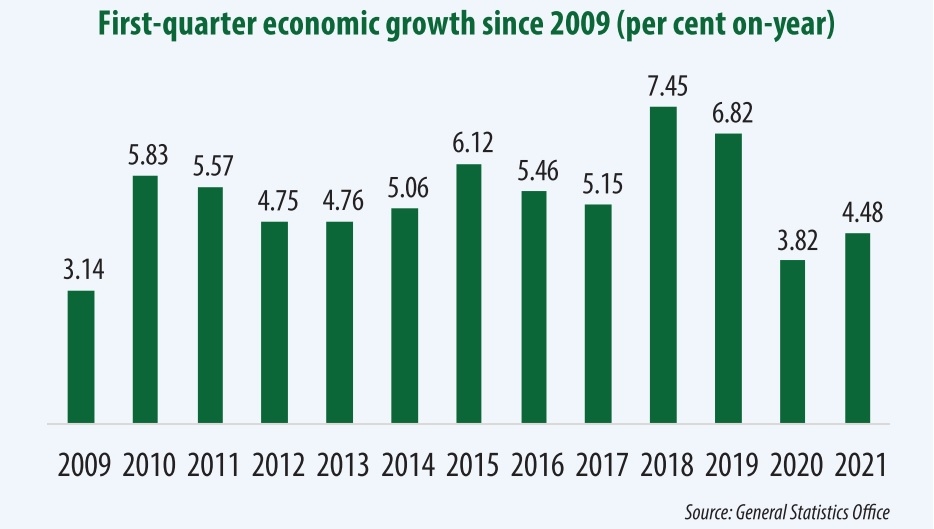Right time to reform for future success
 |
| Andrew Jeffries, country director for Vietnam of the Asian Development Bank |
“You are so lucky to be working in Vietnam,” my colleague from abroad told me. “Vietnamese people are fortunate to be able to lead normal lives, visit restaurants, travel domestically, and their children can attend school in person at a time when COVID-19 is still active and preventing many of these activities in many other countries.” Certainly, more than anyone, as a foreigner working in Vietnam since August last year, I understand this very well. The evidence is very clear that now as the COVID-19 pandemic is still complicated in many parts of the world, Vietnam remains resilient and successfully contained the new waves of outbreaks.
In 2020, although Vietnam only recorded 2.91 per cent growth, the country’s lowest growth rate in the past decade, this remained a remarkable achievement because it is one of the highest growth rates in the world amid the pandemic with enormous loss of life and severe economic damage. With effective policies and measures from the government, Vietnam should be proud of achieving its dual targets – both maintaining positive economic growth and controlling the pandemic to ensure people’s health.
The government’s support packages, especially fiscal support policies such as tax relaxation, are very timely and helpful. Under the government’s instructions, the State Bank of Vietnam (SBV) also provided credit support through debt restructuring, exemption or reduction of interest rates on existing loans, and preferential interest rates for new loans to priority sectors. However, it needs stronger coordination among ministries, sectors, and localities in enhancing information dissemination on supportive policies to facilitate enterprises with easier access to these support packages. Detailed and complete guidance is needed on the implementation and simplification of the process for businesses to follow, particularly for small- and medium-sized enterprises.
Maintaining momentum
Indeed, 2020 was a very difficult year, but also the year to recognise the efforts of the business community in overcoming the challenges caused by the pandemic. Businesses have been hit hard by the pandemic with adverse consequences such as imbalance of cash flow and disruptions in supply chains. Many enterprises had to reduce their number of employees, stop operations and withdraw from the market, or even go bankrupt.
However, in difficult circumstances, many businesses actively changed their strategies, took the chance to restructure, retrain staff, and focus more on the domestic market and diversifying their consumer markets, and ensuring the supply within the country. Many businesses have also taken the opportunity to step up technology transformation to improve productivity and catch up with the trend of digital transformation.
Thanks to effective policies from the government and strong efforts of the business community, Vietnam was able to maintain good growth momentum, taking opportunities from the shift of supply chains in the region, and to further strengthen the already strong foundation for macroeconomic stability and continue to be one of the fastest-growing economies in the region in 2021.
In the newly-released Asian Development Outlook 2021, the Asian Development Bank (ADB) raised its forecast for Vietnam’s economic growth to 6.7 per cent in 2021 and 7 per cent in 2022 — strong and steady growth made possible by Vietnam’s success in containing the pandemic. However, in my view, the growth quality is more important than specific numbers.
In the 2021 outlook, the ADB recommends Vietnam to continue maintaining prudent macroeconomic policies this year to ensure a sustainable and inclusive recovery process and accelerating economic reforms towards a more enabling and innovation-friendly environment, while enhancing risk management under ‘new normal’ conditions.
Reality has proven that the domestic economy cannot be separated from outside markets. With such a large, open economy, Vietnam will continue to face many challenges in the context of the unpredictable pandemic as well as possible increased trade protection and financial risks. Now is the right time for Vietnam to have a deeper look into production issues, and imports and exports, because exports are growing, while the contribution of domestic enterprises to the export value remains low, mainly from foreign-invested enterprises with about 70 per cent.
Vietnam will need to maximise the opportunities and benefits from the free trade agreements that the country participates in, so that the Vietnamese businesses can participate more deeply in global supply chains, including becoming direct suppliers for foreign investment-led manufacturing and increase the value addition as well as national competitiveness. Besides that, Vietnam needs to find ways to strengthen its domestic market and improve product quality so that Vietnamese consumers have a chance to enjoy the best products produced in the country.
 |
Connecting communities
When it comes to enhancing competitiveness and efficiency to participate more deeply in the global value chain, there is an emphasis on the role and power of digital transformation. Digital transformation is not just a global trend but also a new economic growth driver. The Fourth Industrial Revolution is still in its early stages in Vietnam. Taking this opportunity to make a breakthrough, Vietnam can become a digital economy in the future.
At the upstream level, the Party and government of Vietnam determined that digital transformation is key to proactively catching up with Industry 4.0. We observed that agencies and units have been established to handle digital transformation in conjunction with recognising modern work arrangements and especially employer’s responsibilities to reskill employees. International experiences have shown that digital transformation can face many difficulties at the beginning but will bring high efficiency in the long run.
At the corporate level, digital transformation can start with creating forums connecting the business community and entrepreneurs with digital applications and solutions to increase competitiveness in providing quality products and services meeting the increasing demands of the domestic and international markets.
Experts also pointed out challenges hindering digital transformation in Vietnamese enterprises, including lack of information on new digital technology, shortage of qualified human resources to apply and utilise digital technology, lack of financial resources to invest in digital infrastructure in addition to affordability issues given the high cost of digital technology applications, and risks of data security and safety of digital transactions.
Vietnamese businesses have an advantage, when digital technologies such as cloud computing, the Internet of Things, AI, and more have been developed by domestic tech companies and deployed in corporate governance solutions. With this advantage, domestic businesses can cooperate with partners in digital technology to get the most effective solutions, while saving costs and time.
The pandemic has also created an opportunity to demonstrate the significant role of digital technology in state management, in production, business activities and for social welfare. Digital technology could be considered as a factor to help ensure a sustainable and inclusive recovery. COVID-19 created a push to promote digital transformation to meet the immediate needs of people to access basic social services as well as new forms of services without direct contact, such as online shopping or making payments via mobile banking or e-wallets.
We are so delighted to witness the ADB’s partnership with the SBV in enabling a fintech ecosystem in Vietnam as well as supporting the application of fintech solutions to promote financial inclusion. In cooperation with Vietnamese project counterparts, the ADB also introduced digital solutions in some sectors, such as introducing disaster early warning systems in disaster mitigation projects in the central region provinces. We continue discussions with relevant ministries, agencies, and localities on development of smart, digital solutions for urban areas.
With solid foundations, and the new government’s continued commitment to further strengthen institutional reforms, there is no doubt that Vietnam will overcome the pandemic and recover strongly in the coming years.
What the stars mean:
★ Poor ★ ★ Promising ★★★ Good ★★★★ Very good ★★★★★ Exceptional
Related Contents
Latest News
More News
- NAB Innovation Centre underscores Vietnam’s appeal for tech investment (January 30, 2026 | 11:16)
- Vietnam moves towards market-based fuel management with E10 rollout (January 30, 2026 | 11:10)
- Vietnam startup funding enters a period of capital reset (January 30, 2026 | 11:06)
- Vietnam strengthens public debt management with World Bank and IMF (January 30, 2026 | 11:00)
- PM inspects APEC 2027 project progress in An Giang province (January 29, 2026 | 09:00)
- Vietnam among the world’s top 15 trading nations (January 28, 2026 | 17:12)
- Vietnam accelerates preparations for arbitration centre linked to new financial hub (January 28, 2026 | 17:09)
- Vietnam's IPO market on recovery trajectory (January 28, 2026 | 17:04)
- Digital economy takes centre stage in Vietnam’s new growth model (January 28, 2026 | 11:43)
- EU Council president to visit Vietnam amid partnership upgrade (January 28, 2026 | 11:00)

 Tag:
Tag:


















 Mobile Version
Mobile Version